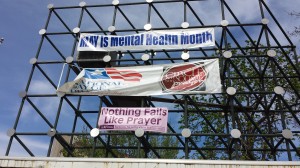
Since I first came out as an atheist in 2009, Christians have claimed offense in response to my public efforts. Here’s my short response.
‘I am offended’ is often a conversation stopper. Rather than discussing why someone is offended or discussing an issue at hand, some Christians will cast me as a bad person for openly disagreeing with their religious views while resorting to tactics of imposing shame and guilt.
No matter what my message is or how mild I may be in transmitting it, people often complain whether saying the word ‘atheists,’ appearing on a bus advertisement, is “attacking religion” or a banner reading ‘Nothing Fails Like Prayer’ is offensive and disrespectful [when hung as a response to a National Day of Prayer event] as Rev. Michael Brewster — a pastor I recently debated — explained to me.
The message ‘Nothing Fails Like Prayer’ — while it is provocative — is not an attack on an individual. Rather, ‘Nothing Fails Like Prayer’ is a response to a claim — that praying to a supernatural being will result in supernatural intervention in human affairs — stating that the claim fails to, at the very least, stand to scrutiny.

Why would someone claim offense when a belief they hold is challenged? I can understand that people may cherish their beliefs and, because of this, feel slight discomfort when challenged, but when faced with such a mild message such as ‘Nothing Fails Like Prayer’ claiming offense seems to be an inappropriate response. After all, there ought to be a good reason for a person claiming offense.
I could understand Christians claiming offense if a banner read ‘Christianity is a mental illness’ or ‘All Christians are unintelligent’ because both claims would rightly be viewed as personal attacks intended to demean individuals. ‘Nothing Fails Like Prayer,’ though, is very much unlike offensive banners previously mentioned.
If a mild challenge to your religious beliefs leads you to claim offense, I would like you to evaluate your feeling. Ask yourself why you are offended. Why would someone so firmly and sincerely holding a belief claim offense when a belief is challenged in a mild way? Why should your feelings take precedent over others sharing their views? Should your claiming offense compel others to silence themselves? Why should others silence themselves when your sharing of beliefs is permissible?
Personally, I don’t claim offense when Christians share their beliefs. I don’t even tell people who inform me that I deserve to burn in Hell for eternity (and argue that this is moral) that I am offended. I instead have conversations with people, talking about disagreements, and do not engage in shaming tactics. Perhaps I will author a response to someone on my website or write something on social media.

Photo by A. Elizabeth Baumeitster
Since 2009, I have regularly exposed myself to arguments from Christians, participated in many open discussions/debates, invited discussion from Christians, and have even protested Christian events. I had numerous discussions with Christians and do not claim offense.
Why, then, does the Christian claim offense when I do not? Is the reason lack of exposure to different viewpoints, immaturity, unwillingness to engage with people who disagree, a connection to a belief so personal that any disagreement is thought of as disrespect? Is an all-knowing, all-powerful, all-loving being somehow slighted by a mere mortal openly disagreeing with a claim about a supernatural phenomenon?
If your Christian belief is extremely important, and you believe that dedication to God/a church is imperative, you should be concerned with whether your beliefs are true and — in doing so — seek challenges to your beliefs. For if Christian belief is unjustified, you have misprioritized and were deceived. If Christian belief is justified — and you believe you should save souls — if should be important to, as the Bible commands in 1 Peter 3:15, prepare a defense for your faith and do so with gentleness and respect. After all, what should truth have to fear?
As always, please leave your comments below.